第十七课时 九年级Units(1-3)教材精讲精练课件—鲁教版中考英语一轮复习
文档属性
| 名称 | 第十七课时 九年级Units(1-3)教材精讲精练课件—鲁教版中考英语一轮复习 |
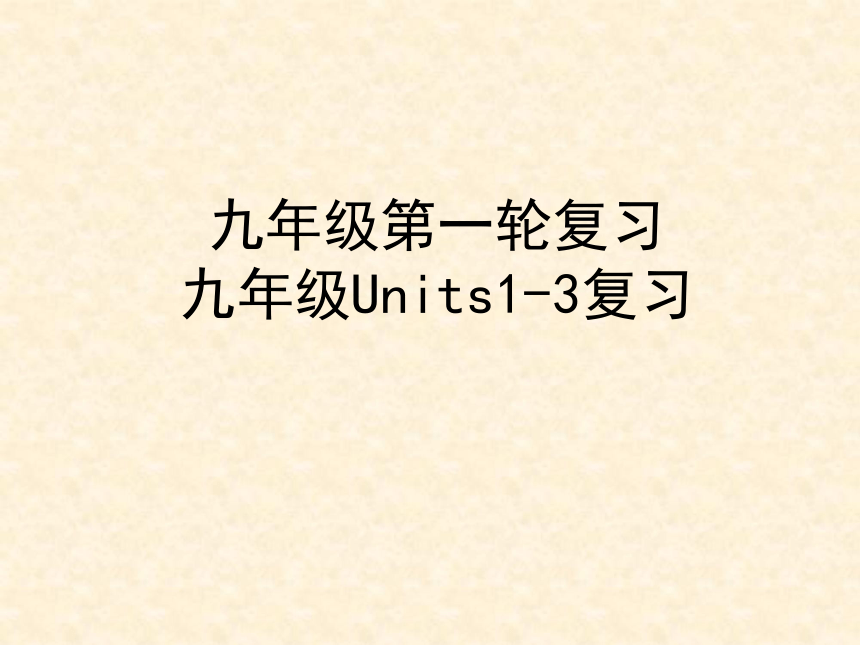
|
|
| 格式 | zip | ||
| 文件大小 | 47.6KB | ||
| 资源类型 | 试卷 | ||
| 版本资源 | 鲁教版 | ||
| 科目 | 英语 | ||
| 更新时间 | 2023-05-05 00:00:00 | ||
图片预览

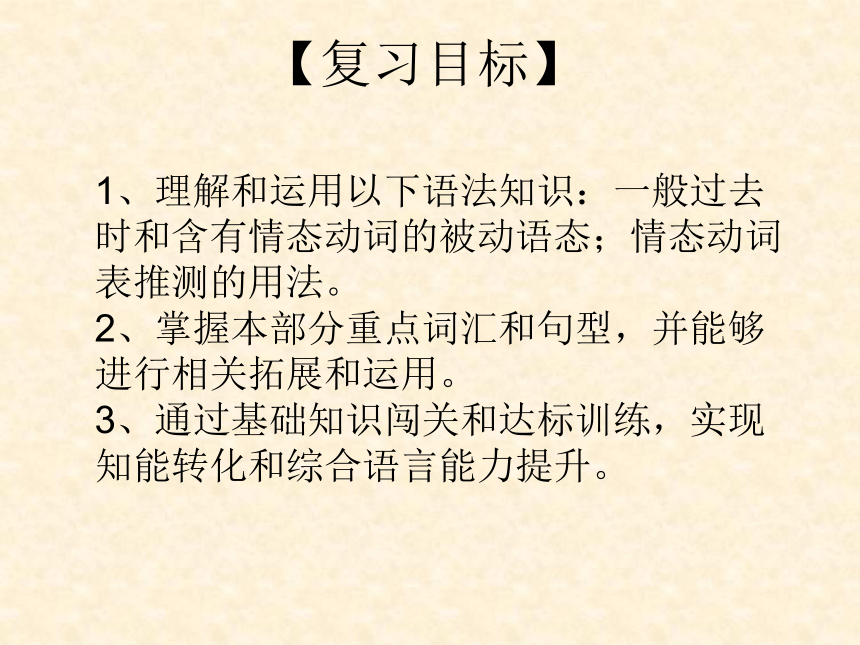
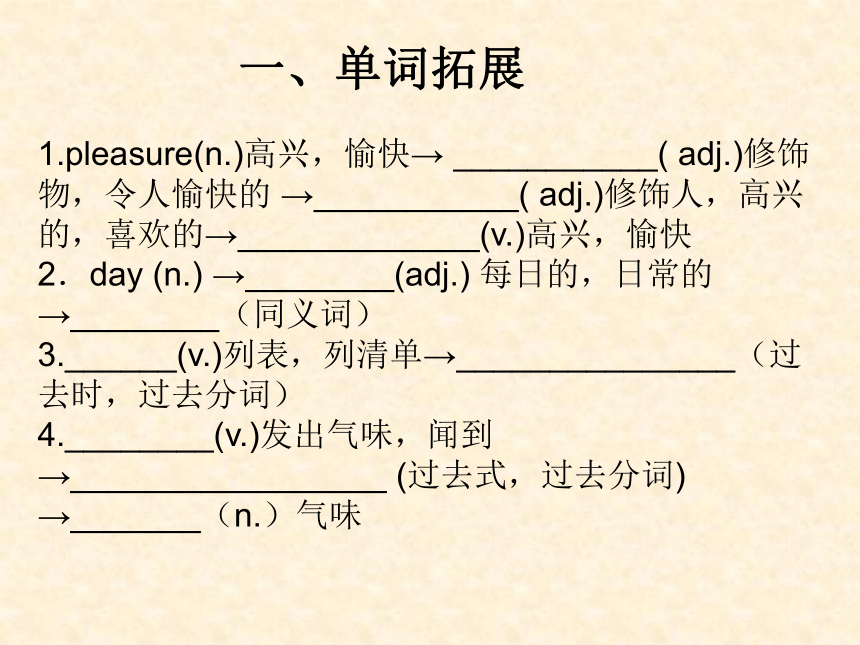
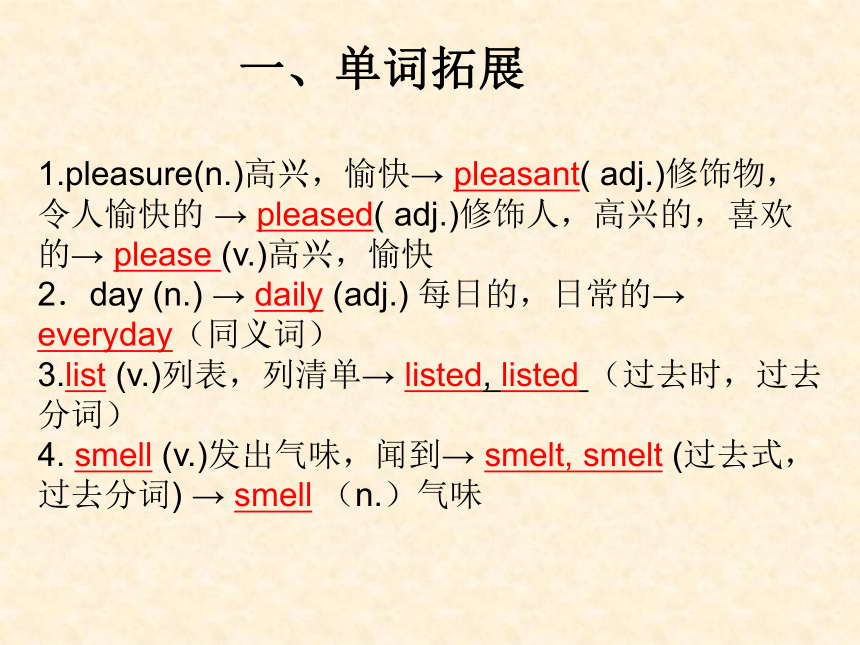

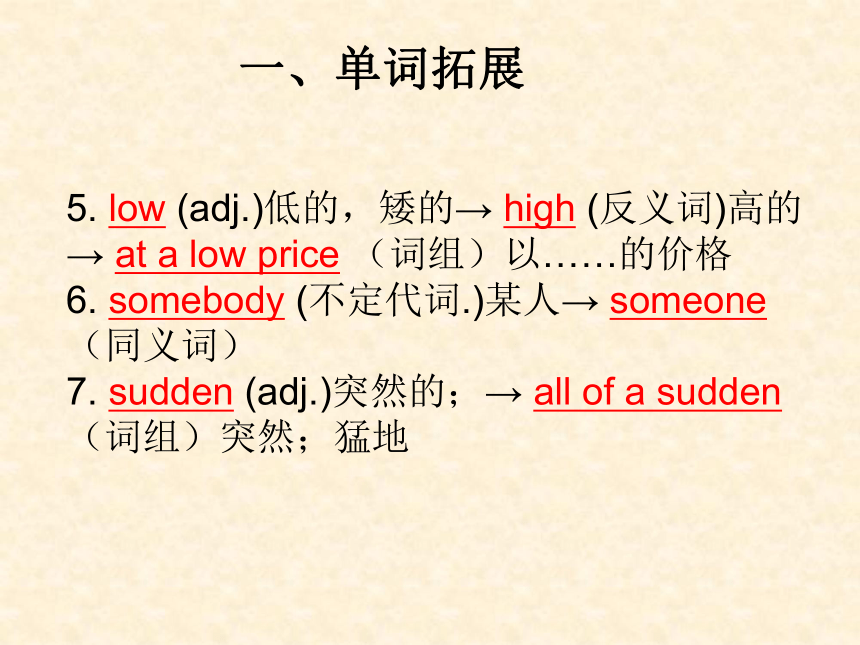
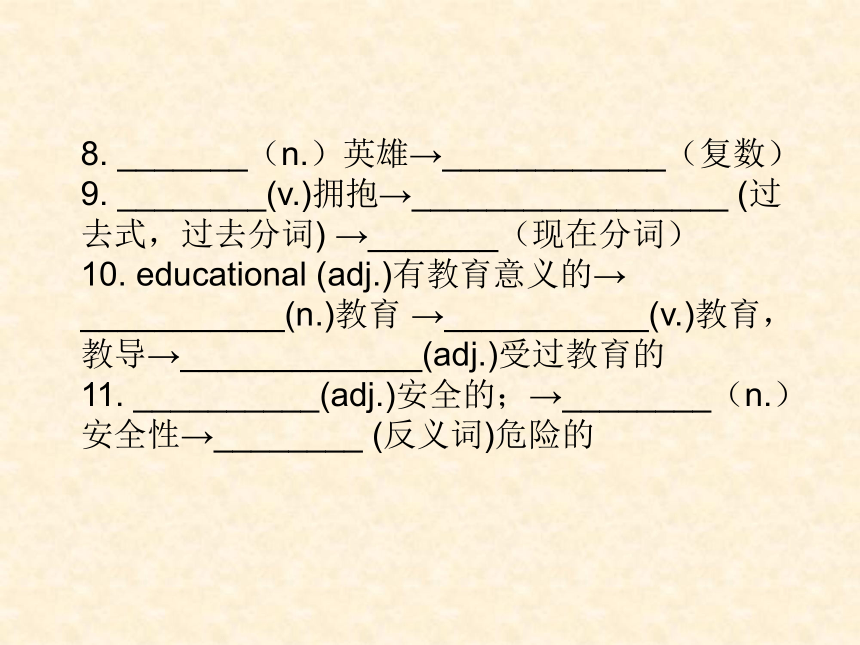
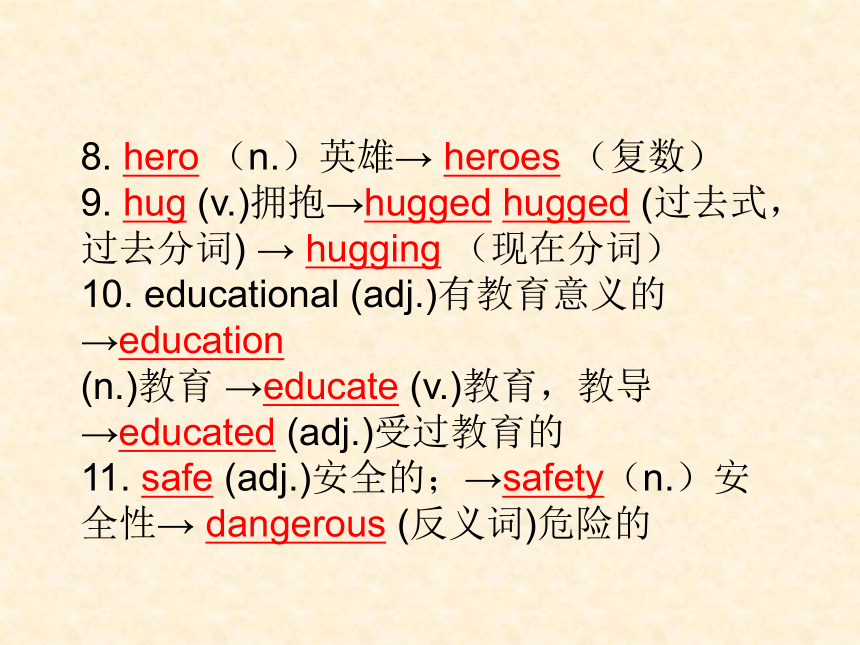
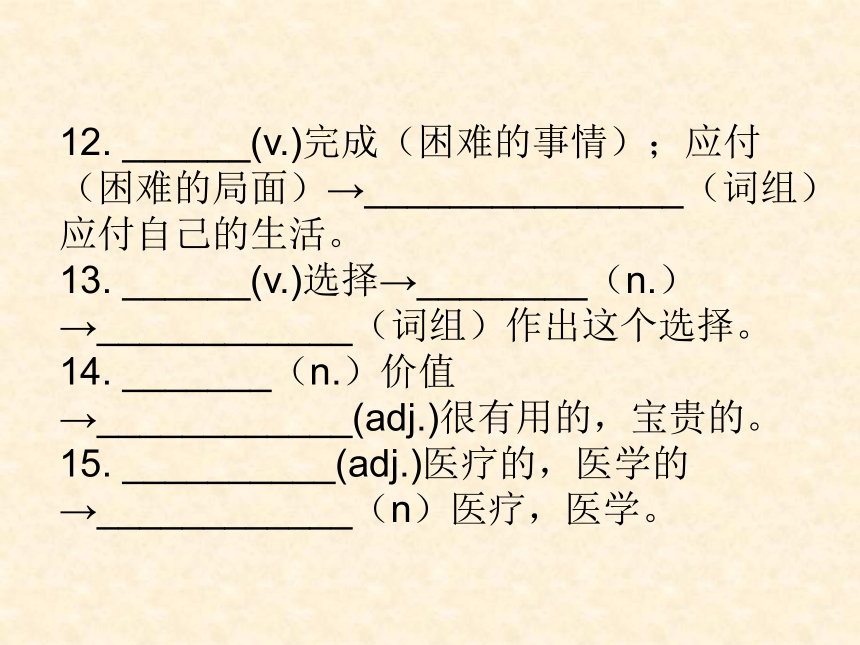

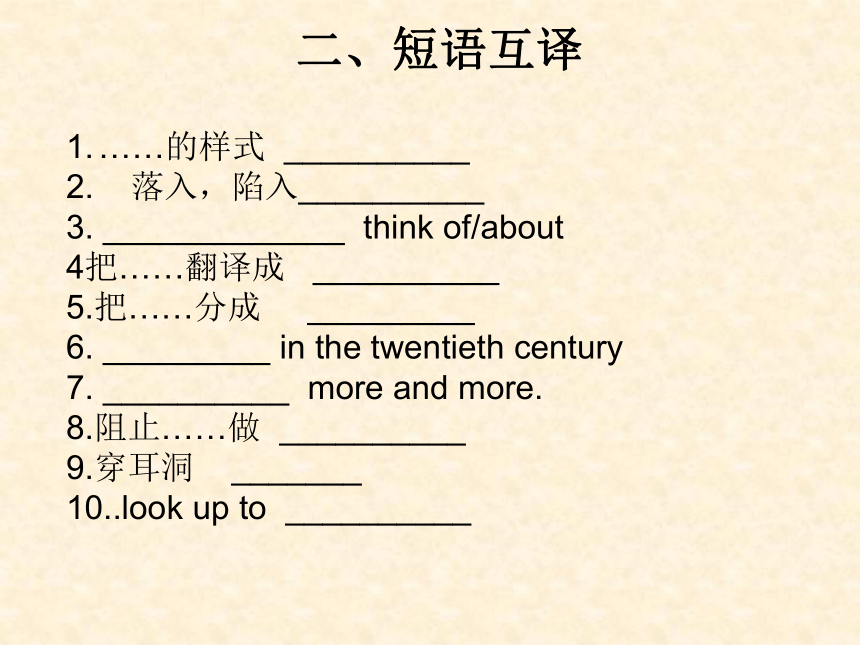
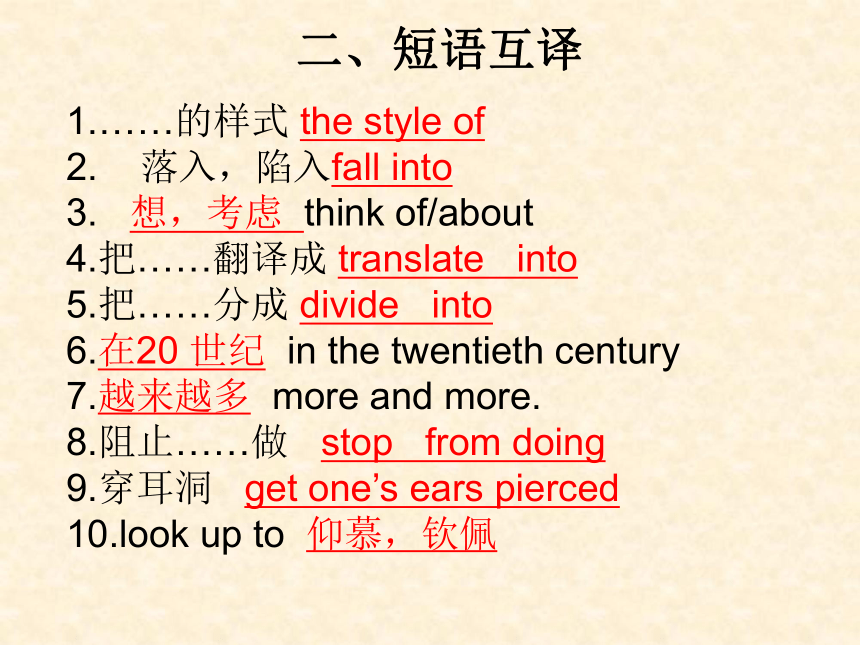
文档简介
(共50张PPT)
九年级第一轮复习
九年级Units1-3复习
1、理解和运用以下语法知识:一般过去 时和含有情态动词的被动语态;情态动词表推测的用法。
2、掌握本部分重点词汇和句型,并能够进行相关拓展和运用。
3、通过基础知识闯关和达标训练,实现知能转化和综合语言能力提升。
【复习目标】
1.pleasure(n.)高兴,愉快→ ___________( adj.)修饰物,令人愉快的 →___________( adj.)修饰人,高兴的,喜欢的→_____________(v.)高兴,愉快
2.day (n.) →________(adj.) 每日的,日常的→________(同义词)
3.______(v.)列表,列清单→_______________(过去时,过去分词)
4.________(v.)发出气味,闻到→_________________ (过去式,过去分词) →_______(n.)气味
一、单词拓展
1.pleasure(n.)高兴,愉快→ pleasant( adj.)修饰物,令人愉快的 → pleased( adj.)修饰人,高兴的,喜欢的→ please (v.)高兴,愉快
2.day (n.) → daily (adj.) 每日的,日常的→ everyday(同义词)
3.list (v.)列表,列清单→ listed, listed (过去时,过去分词)
4. smell (v.)发出气味,闻到→ smelt, smelt (过去式,过去分词) → smell (n.)气味
一、单词拓展
5.________(adj.)低的,矮的→________ (反义词)高的→____________(词组)以……的价格
6.__________(不定代词.)某人→________(同义词)
7.__________(adj.)突然的;→____________(词组)突然;猛地
一、单词拓展
5. low (adj.)低的,矮的→ high (反义词)高的→ at a low price (词组)以……的价格
6. somebody (不定代词.)某人→ someone (同义词)
7. sudden (adj.)突然的;→ all of a sudden (词组)突然;猛地
一、单词拓展
8. _______(n.)英雄→____________(复数)
9. ________(v.)拥抱→_________________ (过去式,过去分词) →_______(现在分词)
10. educational (adj.)有教育意义的→ ___________(n.)教育 →___________(v.)教育,教导→_____________(adj.)受过教育的
11. __________(adj.)安全的;→________(n.)安全性→________ (反义词)危险的
8. hero (n.)英雄→ heroes (复数)
9. hug (v.)拥抱→hugged hugged (过去式,过去分词) → hugging (现在分词)
10. educational (adj.)有教育意义的→education
(n.)教育 →educate (v.)教育,教导→educated (adj.)受过教育的
11. safe (adj.)安全的;→safety(n.)安全性→ dangerous (反义词)危险的
12. ______(v.)完成(困难的事情);应付(困难的局面)→_______________(词组)应付自己的生活。
13. ______(v.)选择→________(n.)→____________(词组)作出这个选择。
14. _______(n.)价值→____________(adj.)很有用的,宝贵的。
15. __________(adj.)医疗的,医学的→____________(n)医疗,医学。
12. manage (v.)完成(困难的事情);应付(困难的局面)→ manage one’s own life(词组)应付自己的生活。
13. choose (v.)选择→choice(n.)→ make this choice (词组)作出这个选择。
14. value(n.)价值→valuable (adj.)很有用的,宝贵的。
15. medical (adj.)医疗的,医学的→ medicine (n)医疗,医学。
……的样式 __________
2. 落入,陷入__________
3. _____________ think of/about
4把……翻译成 __________
5.把……分成 _________
6. _________ in the twentieth century
7. __________ more and more.
8.阻止……做 __________
9.穿耳洞 _______
10..look up to __________
二、短语互译
……的样式 the style of
2. 落入,陷入fall into
3. 想,考虑 think of/about
4.把……翻译成 translate into
5.把……分成 divide into
6.在20 世纪 in the twentieth century
7.越来越多 more and more.
8.阻止……做 stop from doing
9.穿耳洞 get one’s ears pierced
10.look up to 仰慕,钦佩
二、短语互译
不够谨慎 __________
12. 为…… 担心 __________
13. _____________ dream of
14.挡……的路 __________
15.给某人一个拥抱 _________
16. _________ tall back
17. __________ keep……away from
18.追赶 __________
19.属以某人 _____________
20. 战胜敌人 __________
二、短语互译
不够谨慎 not serious enough
12. 为…… 担心 be worried about
13.梦想 dream of
14.挡……的路 get in the way of
15.给某人一个拥抱 give sb. a hug
16.顶嘴 tall back
17.避免,接触 keep……away from
18.追赶 run after
19.属于某人 belong to
20. 战胜敌人 a victory over an enemy
二、短语互译
21.被用来 ______________
22.…… 的数量 __________
23.最终成为 __________
24.不但…… 而且 __________________
25.nothing much___________________
26. in a certain way_________________
27. feel sleepy _________
28.must have done __________
29.做某事有乐趣__________
30.驾照__________
二、短语互译
21.被用来 be used for
22.…… 的数量 the number of
23.最终成为 end up as
24.不但…… 而且 not only but also
25.nothing much没有什么
26. in a certain way以某种方式
27. feel sleepy感到困倦
28.must have done一定已经做了某事
29.做某事有乐趣have fun doing sth.
30.驾照driver’s license
二、短语互译
1.电视是什么时候被发明的?
When __________ the TV_______
我认为是在汽车之后。
I _______ the TV was invented ________ the car.
2.人们认为,茶在6至7世纪传到了朝鲜半岛和日本。
_______ _______ _______ that tea _______ _______ _______Korea and Japan the 6th and 7th. Centuries.
3.尽管现在很多人了解茶文化,但是毫无疑问中国人才是最懂茶的本质的人。
_______ _______ many people now know about _______ _______ ,the Chinese
_______ _______ _______the ones who best understand _______ _______ _______.
三、核心句子
1.电视是什么时候被发明的?
When was the TV invented
我认为是在汽车之后。
I think the TV was invented after the car.
2.人们认为茶在6至7世纪传到了朝鲜半岛和日本。
It is believed that tea was brought to Korea and Japan the 6th and 7th. Centuries.
3.尽管现在很多人了解茶文化,但是毫无疑问中国人才是最懂茶的本质的人。
Even though many people now know about tea culture the Chinese
are without doubt the ones who best understand the nature of tea.
三、核心句子
4.这些明星激励着年轻人为实现他们的梦想而努力。
These stars _______.young people _______ work hard _______ _______ their dreams..
5.我后悔顶嘴,不听妈妈的话。
I regret ______ ______ ,not ______ ______ mom.
4.这些明星激励着年轻人为实现他们的梦想而努力。
These stars encouge young people to work hard to achieve their dreams..
5.我后悔顶嘴,不听妈妈的话。
I regret talking back ,not listening to mom.
6.我认为不应该允许16岁的青少年开车。我担心你的安全。
I ______ ______ sixteen-year-olds should ______ ______ drive.
7.他也许是跑着赶公共汽车去上班。
He ______ ______ ______ to catch a bus to work.
8. 一定有什么东西闯入我们社区的住户家中。
______ ______ ______ ______ ______ the homes in our neighborhood.
6.我认为不应该允许16岁的青少年开车。我担心你的安全。
I don’t think sixteen-year-olds should be allowed todrive.
7.他也许是跑着赶公共汽车去上班。
He might be running to catch a bus to work.
8. 一定有什么东西闯入我们社区的住户家中。
There must be something visting the homes in our neighborhood.
9. 巨石阵,一个岩石圈,不仅是英国最著名最神秘的事物之一。
Stonehenge, a rock circle, is ______ ______ one of Britain’s most famous historical places ______ ______ one of its ______ ______.
10.你知道土豆条是偶然发明的吗?
Do you know potato chips were invented ______ ______.
9. 巨石阵,一个岩石圈,不仅是英国最著名最神秘的事物之一。
Stonehenge, a rock circle, is not only one of Britain’s most famous historical places but also one of its greatest mysteries .
10.你知道土豆条是偶然发明的吗?
Do you know potato chips were invented by accident
,..
11.当我两岁穿过田野的时候,她确保我是安全的,让我远离危险。
When I was two running through the field, she made sure I was safe and ______ ______. ______ ______..
12.只有那样我才有机会实现我的梦想。
______. ______ ______..I have a chance to ______.. my dream.
13.我们不反对赛跑,因为她对赛跑是认真的。
We ______ . ____________. ____________. ______, because he is
____________. ____________. ______.
11.当我两岁穿过田野的时候,她确保我是安全的,让我远离危险。
When I was two running through the field, she made sure I was safe and kept me from danger .
12.只有那样我才有机会实现我的梦想。
Only then will I have a chance to achieve my dream.
13.我们不反对赛跑,因为她对赛跑是认真的。
We have nothing against, because he is
serious about running.
14.我早在我其余的朋友离开之前离开了。
I left early, before ______. ______ ______ my friends.
15.无论我们有多少困难,我相信最终所有问题都可以解决。
No ______. ______ ______ difficulties we have, I believe all problems can ______ ______ in the end.
14.我早在我其余的朋友离开之前离开了。
I left early, before the rest of my friends.
15.无论我们有多少困难,我相信最终所有问题都可以解决。
No matter how many difficulties we have, I believe all problems canbe solved in the end.
1.被动语态。
e.g.:拉链在1893年被发明的。
The zipper ______ ______ in 1893.
青少年应该被允许自己选择衣服。
___________________________________________________________
根据以上例句归纳:
1)一般过去时被动语态结构以及疑问与否定句式。
___________________________________________________________
___________________________________________________________
__________________________________________________________
一、语法突破
1.被动语态。
e.g.:拉链在1893年被发明的。
The zipper was invented in 1893.
青少年应该被允许自己选择衣服。
Teenagers should be allowed to chose their own clothes .
根据以上例句归纳:
1)一般过去时被动语态结构以及疑问与否定句式。
主语+及物动词的过去分词+其他。
Was/were+主语+及物动词的过去分词+其他
主语+was/were+not+及物动词的过去分词+其他。
一、语法突破
2)含有情态动词的被动语态结构以及疑问与否定句式。
___________________________________________________________
___________________________________________________________
__________________________________________________________
2)含有情态动词的被动语态结构以及疑问与否定句式。
主语+情态动词+be+及物动词的过去分词+其他。
情态动词+主语+ be+及物动词的过去分词+其他
主语+情态动词+not+be+及物动词的过去分词+其他。
2.情态动词表推测。
eg: 她一定是Carla 的
它不可能是一只狗,我认为它可能是一头熊或一只狼。 _______________________________________________________
根据以上例句归纳:
用在肯定句中表示有把握的肯定推测,意为 。 用在否定句中表示有把握的否定推测,意为
;而表示无把握的推测的情态动词有 等 。
2.情态动词表推测。
eg: 她一定是Carla 的。
It must belong to Carla.
它不可能是一只狗,我认为它可能是一头熊或一只狼。It can’t be a dog .I think it might be a bear or a wolf.
根据以上例句归纳:
must 用在肯定句中表示有把握的肯定推测,意为一定,肯定。 can’t用在否定句中表示有把握的否定推测,意为
不可能;而表示无把握的推测的情态动词有 can, could ,may , might等。
。..
一、单项选择。
1. Mary to the party. She had a wonderful time with us.
A. invites B. is invited
C. was invited D. has invited
2. He used to in the sun, but now he is used to at night.
A. read;read B. reading;read
C. read;reading D. reading;reading
【反馈提升】
一、单项选择。
1. Mary C to the party. She had a wonderful time with us.
A. invites B. is invited
C. was invited D. has invited
2. He used to C in the sun, but now he is used to C at night.
A. read;read B. reading;read
C. read;reading D. reading;reading
【反馈提升】
3-.Haven’t you seen the notice “No photos _______ here”
- I’m sorry, I _______it.
A .is allowed to be taken; didn’t notice
B. should be allowed to take; haven’t noticed
C. is allowed to be taken; am not noticing
D. should be allowed taking; was not noticing
【反馈提升】
3-.Haven’t you seen the notice “No photos _______ here”
- I’m sorry, I _______it.
A .is allowed to be taken; didn’t notice
B. should be allowed to take; haven’t noticed
C. is allowed to be taken; am not noticing
D. should be allowed taking; was not noticing
【反馈提升】
A
4.- _______. Bookcase is this
- It must be _______.
Who’s ; Tom’s B. Who’s; Tom
C. Whose; Tom’s D. Whose ;Tom
5. I am in trouble, my best friend Li Ly always helps me.
Whenever B. Whatever
C. However D. Never
【反馈提升】
4.- _______. Bookcase is this
- It must be _______.
Who’s ; Tom’s B. Who’s; Tom
C. Whose; Tom’s D. Whose ;Tom
5. I am in trouble, my best friend Li Ly always helps me.
Whenever B. Whatever
C. However D. Never
【反馈提升】
C
A
1.You’ve driven too fast. Please show me your l_______.
2.Did you _______ (出席;参加) the meeting last week.
3.I’m glad to r______ your letter.
4.You should always knock at the door before you e_____ a room.
5.The cup is _______ (几乎) empty.
二、根据句意和首字母提示,
补全单词。
1.You’ve driven too fast. Please show me your license.
2.Did you attend (出席;参加) the meeting last week.
3.I’m glad to receive your letter.
4.You should always knock at the door before you e nter a room.
5.The cup is nearly (几乎) empty.
二、根据句意和首字母提示,
补全单词。
6.We call the persons who are between 13 and 19 t_______..
7.He is s_______ because he often does foolish things like this.
8.These kinds of machines __________(制造) in Japan.
9.I’m not ________ about her ,because she can take care of herself.
10.That computer is mine. It ________ to me.
6.We call the persons who are between 13 and 19 teenagers.
7.He is silly because he often does foolish things like this.
8.These kinds of machines are made (制造) in Japan.
9.I’m not serious about her ,because she can take care of herself.
10.That computer is mine. It belong to me.
Most parents shout at their children when their son or 1 fails to do their homework. But my parents are 2 . They often say, “Play more, read more, and watch more.” Sometimes when I am doing my homework at night, my dad will say to me, “Do not do it 3 . Go to play!” Sometimes I am puzzled and 4 about the reason. Then they will answer, “You are a big girl now. You can do what you’re 5 in.
三、综合填空。根据短文内容及首字母提示补全单词, 使短文完整、通顺。
communicate, families, do, with, friendly,
different, anymore, wonder, interested
Most parents shout at their children when their son or daughter fails to do their homework. But my parents are different . They often say, “Play more, read more, and watch more.” Sometimes when I am doing my homework at night, my dad will say to me, “Do not do it anymore . Go to play!” Sometimes I am puzzled and wonder about the reason. Then they will answer, “You are a big girl now. You can do what you’re interested in.
三、综合填空。根据短文内容及首字母提示补全单词, 使短文完整、通顺。
communicate, families, do, with, friendly,
different, anymore, wonder, interested
We think you have the right.” I thank my parents for being so thoughtful. In many __6, parents and children can’t 7 well. being so thoughtful. Parents usually make their children 8 what they don’t want to do. Things are different 9 me. I have open-minded and humorous parents. My family also has a 10 warm atmosphere(气氛). I like my parents very much, and I think they are very cool.
We think you have the right.” I thank my parents for being so thoughtful. In many families, parents and children can’t communicate well. being so thoughtful. Parents usually make their children do what they don’t want to do. Things are different with me. I have open-minded and humorous parents. My family also has a friendly warm atmosphere(气氛). I like my parents very much, and I think they are very cool.
某英文报社正就“家规”这一话题开展题为“My home rules”的征文活动。请根据以下要点,写一篇英语短文参加此次活动。
要点:
(1)父母制定的规矩太多,如过于重 视考试结果,不很理解自己等;
(2)你对这些家规的看法;
(3)是否愿意遵守这些家规。
四、阅读表达
My home rules
In my opinion, I have too many rules at home. My parents never allow me to go out with my friends at night. They don’t allow me to choose my own clothes, either. And they pay too much attention to my exam results. I think my parents don’t quite understand me.
However, I try my best to understand them. Although they don’t allow me to make my own decisions and give me too much pressure, I know that it is because they really love me and want me to have a bright future.
There’re so many rules in my home, but I think they’re good for me. Follow the rules, and I’ll make a lot of progress.
九年级第一轮复习
九年级Units1-3复习
1、理解和运用以下语法知识:一般过去 时和含有情态动词的被动语态;情态动词表推测的用法。
2、掌握本部分重点词汇和句型,并能够进行相关拓展和运用。
3、通过基础知识闯关和达标训练,实现知能转化和综合语言能力提升。
【复习目标】
1.pleasure(n.)高兴,愉快→ ___________( adj.)修饰物,令人愉快的 →___________( adj.)修饰人,高兴的,喜欢的→_____________(v.)高兴,愉快
2.day (n.) →________(adj.) 每日的,日常的→________(同义词)
3.______(v.)列表,列清单→_______________(过去时,过去分词)
4.________(v.)发出气味,闻到→_________________ (过去式,过去分词) →_______(n.)气味
一、单词拓展
1.pleasure(n.)高兴,愉快→ pleasant( adj.)修饰物,令人愉快的 → pleased( adj.)修饰人,高兴的,喜欢的→ please (v.)高兴,愉快
2.day (n.) → daily (adj.) 每日的,日常的→ everyday(同义词)
3.list (v.)列表,列清单→ listed, listed (过去时,过去分词)
4. smell (v.)发出气味,闻到→ smelt, smelt (过去式,过去分词) → smell (n.)气味
一、单词拓展
5.________(adj.)低的,矮的→________ (反义词)高的→____________(词组)以……的价格
6.__________(不定代词.)某人→________(同义词)
7.__________(adj.)突然的;→____________(词组)突然;猛地
一、单词拓展
5. low (adj.)低的,矮的→ high (反义词)高的→ at a low price (词组)以……的价格
6. somebody (不定代词.)某人→ someone (同义词)
7. sudden (adj.)突然的;→ all of a sudden (词组)突然;猛地
一、单词拓展
8. _______(n.)英雄→____________(复数)
9. ________(v.)拥抱→_________________ (过去式,过去分词) →_______(现在分词)
10. educational (adj.)有教育意义的→ ___________(n.)教育 →___________(v.)教育,教导→_____________(adj.)受过教育的
11. __________(adj.)安全的;→________(n.)安全性→________ (反义词)危险的
8. hero (n.)英雄→ heroes (复数)
9. hug (v.)拥抱→hugged hugged (过去式,过去分词) → hugging (现在分词)
10. educational (adj.)有教育意义的→education
(n.)教育 →educate (v.)教育,教导→educated (adj.)受过教育的
11. safe (adj.)安全的;→safety(n.)安全性→ dangerous (反义词)危险的
12. ______(v.)完成(困难的事情);应付(困难的局面)→_______________(词组)应付自己的生活。
13. ______(v.)选择→________(n.)→____________(词组)作出这个选择。
14. _______(n.)价值→____________(adj.)很有用的,宝贵的。
15. __________(adj.)医疗的,医学的→____________(n)医疗,医学。
12. manage (v.)完成(困难的事情);应付(困难的局面)→ manage one’s own life(词组)应付自己的生活。
13. choose (v.)选择→choice(n.)→ make this choice (词组)作出这个选择。
14. value(n.)价值→valuable (adj.)很有用的,宝贵的。
15. medical (adj.)医疗的,医学的→ medicine (n)医疗,医学。
……的样式 __________
2. 落入,陷入__________
3. _____________ think of/about
4把……翻译成 __________
5.把……分成 _________
6. _________ in the twentieth century
7. __________ more and more.
8.阻止……做 __________
9.穿耳洞 _______
10..look up to __________
二、短语互译
……的样式 the style of
2. 落入,陷入fall into
3. 想,考虑 think of/about
4.把……翻译成 translate into
5.把……分成 divide into
6.在20 世纪 in the twentieth century
7.越来越多 more and more.
8.阻止……做 stop from doing
9.穿耳洞 get one’s ears pierced
10.look up to 仰慕,钦佩
二、短语互译
不够谨慎 __________
12. 为…… 担心 __________
13. _____________ dream of
14.挡……的路 __________
15.给某人一个拥抱 _________
16. _________ tall back
17. __________ keep……away from
18.追赶 __________
19.属以某人 _____________
20. 战胜敌人 __________
二、短语互译
不够谨慎 not serious enough
12. 为…… 担心 be worried about
13.梦想 dream of
14.挡……的路 get in the way of
15.给某人一个拥抱 give sb. a hug
16.顶嘴 tall back
17.避免,接触 keep……away from
18.追赶 run after
19.属于某人 belong to
20. 战胜敌人 a victory over an enemy
二、短语互译
21.被用来 ______________
22.…… 的数量 __________
23.最终成为 __________
24.不但…… 而且 __________________
25.nothing much___________________
26. in a certain way_________________
27. feel sleepy _________
28.must have done __________
29.做某事有乐趣__________
30.驾照__________
二、短语互译
21.被用来 be used for
22.…… 的数量 the number of
23.最终成为 end up as
24.不但…… 而且 not only but also
25.nothing much没有什么
26. in a certain way以某种方式
27. feel sleepy感到困倦
28.must have done一定已经做了某事
29.做某事有乐趣have fun doing sth.
30.驾照driver’s license
二、短语互译
1.电视是什么时候被发明的?
When __________ the TV_______
我认为是在汽车之后。
I _______ the TV was invented ________ the car.
2.人们认为,茶在6至7世纪传到了朝鲜半岛和日本。
_______ _______ _______ that tea _______ _______ _______Korea and Japan the 6th and 7th. Centuries.
3.尽管现在很多人了解茶文化,但是毫无疑问中国人才是最懂茶的本质的人。
_______ _______ many people now know about _______ _______ ,the Chinese
_______ _______ _______the ones who best understand _______ _______ _______.
三、核心句子
1.电视是什么时候被发明的?
When was the TV invented
我认为是在汽车之后。
I think the TV was invented after the car.
2.人们认为茶在6至7世纪传到了朝鲜半岛和日本。
It is believed that tea was brought to Korea and Japan the 6th and 7th. Centuries.
3.尽管现在很多人了解茶文化,但是毫无疑问中国人才是最懂茶的本质的人。
Even though many people now know about tea culture the Chinese
are without doubt the ones who best understand the nature of tea.
三、核心句子
4.这些明星激励着年轻人为实现他们的梦想而努力。
These stars _______.young people _______ work hard _______ _______ their dreams..
5.我后悔顶嘴,不听妈妈的话。
I regret ______ ______ ,not ______ ______ mom.
4.这些明星激励着年轻人为实现他们的梦想而努力。
These stars encouge young people to work hard to achieve their dreams..
5.我后悔顶嘴,不听妈妈的话。
I regret talking back ,not listening to mom.
6.我认为不应该允许16岁的青少年开车。我担心你的安全。
I ______ ______ sixteen-year-olds should ______ ______ drive.
7.他也许是跑着赶公共汽车去上班。
He ______ ______ ______ to catch a bus to work.
8. 一定有什么东西闯入我们社区的住户家中。
______ ______ ______ ______ ______ the homes in our neighborhood.
6.我认为不应该允许16岁的青少年开车。我担心你的安全。
I don’t think sixteen-year-olds should be allowed todrive.
7.他也许是跑着赶公共汽车去上班。
He might be running to catch a bus to work.
8. 一定有什么东西闯入我们社区的住户家中。
There must be something visting the homes in our neighborhood.
9. 巨石阵,一个岩石圈,不仅是英国最著名最神秘的事物之一。
Stonehenge, a rock circle, is ______ ______ one of Britain’s most famous historical places ______ ______ one of its ______ ______.
10.你知道土豆条是偶然发明的吗?
Do you know potato chips were invented ______ ______.
9. 巨石阵,一个岩石圈,不仅是英国最著名最神秘的事物之一。
Stonehenge, a rock circle, is not only one of Britain’s most famous historical places but also one of its greatest mysteries .
10.你知道土豆条是偶然发明的吗?
Do you know potato chips were invented by accident
,..
11.当我两岁穿过田野的时候,她确保我是安全的,让我远离危险。
When I was two running through the field, she made sure I was safe and ______ ______. ______ ______..
12.只有那样我才有机会实现我的梦想。
______. ______ ______..I have a chance to ______.. my dream.
13.我们不反对赛跑,因为她对赛跑是认真的。
We ______ . ____________. ____________. ______, because he is
____________. ____________. ______.
11.当我两岁穿过田野的时候,她确保我是安全的,让我远离危险。
When I was two running through the field, she made sure I was safe and kept me from danger .
12.只有那样我才有机会实现我的梦想。
Only then will I have a chance to achieve my dream.
13.我们不反对赛跑,因为她对赛跑是认真的。
We have nothing against, because he is
serious about running.
14.我早在我其余的朋友离开之前离开了。
I left early, before ______. ______ ______ my friends.
15.无论我们有多少困难,我相信最终所有问题都可以解决。
No ______. ______ ______ difficulties we have, I believe all problems can ______ ______ in the end.
14.我早在我其余的朋友离开之前离开了。
I left early, before the rest of my friends.
15.无论我们有多少困难,我相信最终所有问题都可以解决。
No matter how many difficulties we have, I believe all problems canbe solved in the end.
1.被动语态。
e.g.:拉链在1893年被发明的。
The zipper ______ ______ in 1893.
青少年应该被允许自己选择衣服。
___________________________________________________________
根据以上例句归纳:
1)一般过去时被动语态结构以及疑问与否定句式。
___________________________________________________________
___________________________________________________________
__________________________________________________________
一、语法突破
1.被动语态。
e.g.:拉链在1893年被发明的。
The zipper was invented in 1893.
青少年应该被允许自己选择衣服。
Teenagers should be allowed to chose their own clothes .
根据以上例句归纳:
1)一般过去时被动语态结构以及疑问与否定句式。
主语+及物动词的过去分词+其他。
Was/were+主语+及物动词的过去分词+其他
主语+was/were+not+及物动词的过去分词+其他。
一、语法突破
2)含有情态动词的被动语态结构以及疑问与否定句式。
___________________________________________________________
___________________________________________________________
__________________________________________________________
2)含有情态动词的被动语态结构以及疑问与否定句式。
主语+情态动词+be+及物动词的过去分词+其他。
情态动词+主语+ be+及物动词的过去分词+其他
主语+情态动词+not+be+及物动词的过去分词+其他。
2.情态动词表推测。
eg: 她一定是Carla 的
它不可能是一只狗,我认为它可能是一头熊或一只狼。 _______________________________________________________
根据以上例句归纳:
用在肯定句中表示有把握的肯定推测,意为 。 用在否定句中表示有把握的否定推测,意为
;而表示无把握的推测的情态动词有 等 。
2.情态动词表推测。
eg: 她一定是Carla 的。
It must belong to Carla.
它不可能是一只狗,我认为它可能是一头熊或一只狼。It can’t be a dog .I think it might be a bear or a wolf.
根据以上例句归纳:
must 用在肯定句中表示有把握的肯定推测,意为一定,肯定。 can’t用在否定句中表示有把握的否定推测,意为
不可能;而表示无把握的推测的情态动词有 can, could ,may , might等。
。..
一、单项选择。
1. Mary to the party. She had a wonderful time with us.
A. invites B. is invited
C. was invited D. has invited
2. He used to in the sun, but now he is used to at night.
A. read;read B. reading;read
C. read;reading D. reading;reading
【反馈提升】
一、单项选择。
1. Mary C to the party. She had a wonderful time with us.
A. invites B. is invited
C. was invited D. has invited
2. He used to C in the sun, but now he is used to C at night.
A. read;read B. reading;read
C. read;reading D. reading;reading
【反馈提升】
3-.Haven’t you seen the notice “No photos _______ here”
- I’m sorry, I _______it.
A .is allowed to be taken; didn’t notice
B. should be allowed to take; haven’t noticed
C. is allowed to be taken; am not noticing
D. should be allowed taking; was not noticing
【反馈提升】
3-.Haven’t you seen the notice “No photos _______ here”
- I’m sorry, I _______it.
A .is allowed to be taken; didn’t notice
B. should be allowed to take; haven’t noticed
C. is allowed to be taken; am not noticing
D. should be allowed taking; was not noticing
【反馈提升】
A
4.- _______. Bookcase is this
- It must be _______.
Who’s ; Tom’s B. Who’s; Tom
C. Whose; Tom’s D. Whose ;Tom
5. I am in trouble, my best friend Li Ly always helps me.
Whenever B. Whatever
C. However D. Never
【反馈提升】
4.- _______. Bookcase is this
- It must be _______.
Who’s ; Tom’s B. Who’s; Tom
C. Whose; Tom’s D. Whose ;Tom
5. I am in trouble, my best friend Li Ly always helps me.
Whenever B. Whatever
C. However D. Never
【反馈提升】
C
A
1.You’ve driven too fast. Please show me your l_______.
2.Did you _______ (出席;参加) the meeting last week.
3.I’m glad to r______ your letter.
4.You should always knock at the door before you e_____ a room.
5.The cup is _______ (几乎) empty.
二、根据句意和首字母提示,
补全单词。
1.You’ve driven too fast. Please show me your license.
2.Did you attend (出席;参加) the meeting last week.
3.I’m glad to receive your letter.
4.You should always knock at the door before you e nter a room.
5.The cup is nearly (几乎) empty.
二、根据句意和首字母提示,
补全单词。
6.We call the persons who are between 13 and 19 t_______..
7.He is s_______ because he often does foolish things like this.
8.These kinds of machines __________(制造) in Japan.
9.I’m not ________ about her ,because she can take care of herself.
10.That computer is mine. It ________ to me.
6.We call the persons who are between 13 and 19 teenagers.
7.He is silly because he often does foolish things like this.
8.These kinds of machines are made (制造) in Japan.
9.I’m not serious about her ,because she can take care of herself.
10.That computer is mine. It belong to me.
Most parents shout at their children when their son or 1 fails to do their homework. But my parents are 2 . They often say, “Play more, read more, and watch more.” Sometimes when I am doing my homework at night, my dad will say to me, “Do not do it 3 . Go to play!” Sometimes I am puzzled and 4 about the reason. Then they will answer, “You are a big girl now. You can do what you’re 5 in.
三、综合填空。根据短文内容及首字母提示补全单词, 使短文完整、通顺。
communicate, families, do, with, friendly,
different, anymore, wonder, interested
Most parents shout at their children when their son or daughter fails to do their homework. But my parents are different . They often say, “Play more, read more, and watch more.” Sometimes when I am doing my homework at night, my dad will say to me, “Do not do it anymore . Go to play!” Sometimes I am puzzled and wonder about the reason. Then they will answer, “You are a big girl now. You can do what you’re interested in.
三、综合填空。根据短文内容及首字母提示补全单词, 使短文完整、通顺。
communicate, families, do, with, friendly,
different, anymore, wonder, interested
We think you have the right.” I thank my parents for being so thoughtful. In many __6, parents and children can’t 7 well. being so thoughtful. Parents usually make their children 8 what they don’t want to do. Things are different 9 me. I have open-minded and humorous parents. My family also has a 10 warm atmosphere(气氛). I like my parents very much, and I think they are very cool.
We think you have the right.” I thank my parents for being so thoughtful. In many families, parents and children can’t communicate well. being so thoughtful. Parents usually make their children do what they don’t want to do. Things are different with me. I have open-minded and humorous parents. My family also has a friendly warm atmosphere(气氛). I like my parents very much, and I think they are very cool.
某英文报社正就“家规”这一话题开展题为“My home rules”的征文活动。请根据以下要点,写一篇英语短文参加此次活动。
要点:
(1)父母制定的规矩太多,如过于重 视考试结果,不很理解自己等;
(2)你对这些家规的看法;
(3)是否愿意遵守这些家规。
四、阅读表达
My home rules
In my opinion, I have too many rules at home. My parents never allow me to go out with my friends at night. They don’t allow me to choose my own clothes, either. And they pay too much attention to my exam results. I think my parents don’t quite understand me.
However, I try my best to understand them. Although they don’t allow me to make my own decisions and give me too much pressure, I know that it is because they really love me and want me to have a bright future.
There’re so many rules in my home, but I think they’re good for me. Follow the rules, and I’ll make a lot of progress.
